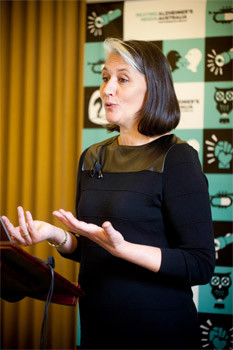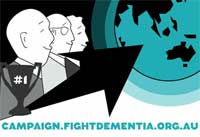Tanya Petrovich Dementia Learning Online Interview

Tanya Petrovich Dementia Learning Online Interview
Alzheimer's Australia Vic has proudly launched its first online learning resource at the fourth biannual Victorian Parliamentary Friends of Dementia meeting at Parliament House.
The launch of Dementia Learning Online, focusing on carer education, was co-convened by Georgie Crozier MP, Parliamentary Secretary for Health and Jenny Mikakos MP, Shadow Minister for Seniors & Ageing.
An innovative and interactive learning environment, Dementia Learning Online aims to achieve practice improvement in the workplace among residential and community carers who play a key role in the lives of people living with dementia.
Maree McCabe, Alzheimer's Australia Vic CEO, said that Dementia Learning Online is an innovative and accessible education resource that will go a long way to supporting and enhancing the quality of care provided to the estimated 320,000 people with dementia in Australia.
'This is a significant step by Alzheimer's Australia Vic to ensure the increasing numbers of carers in Australia are well trained, better informed and best equipped to provide all people living with dementia the highest quality of care that they deserve," Ms McCabe said.
Ms McCabe said that as the number of people with dementia is set to rapidly rise as Australia's population ages, improving the quality of care through best practice training is imperative. 'The intention of launching the online learning resource in Parliament today is to demonstrate to Members the importance of aged care providers in their electorates to aim for best practice dementia care for all staff levels in the care system," she said.
'We congratulate Alzheimer's Australia Vic on their development of this innovative online dementia education program that will make a difference to the lives of all Victorians living with dementia, their families and carers, and encourage aged care providers to adopt the training tool in their professional development program for all staff members," said Ms Crozier and Jenny Mikakos in a joint statement. The online education resource features four modules that are designed to be user friendly, practical and can be completed in less than one hour. Themes focused on throughout the modules range from an introduction to dementia to expectations for service delivery, and enhancing communication skills to adopting effective strategies to help prevent or minimise the impact of behaviour.
Throughout the online modules, participants will be asked to think about and reflect on their practice, then answer a series of questions that will contribute to practice improvement in the workplace.
'Currently, across Victoria, there are 78,000 people living with dementia, which is expected to grow to 141,000 by 2030," Ms McCabe said.
We are committed to enhancing the quality of care of people living with dementia and this innovative online learning tool is an invaluable contribution towards assisting those living and supporting people with dementia in our community," she said.
Alzheimer's Australia Vic's Learning and Development courses are attended by more than 14,000 people each year, with the goal of increasing this reach through the introduction of Dementia Learning Online.
Dementia Learning Online is an Alzheimer's Australia resource produced with the support of the Australian Government. For more information on Dementia Learning Online, go to www.dementialearning.org.au.
For more information on Alzheimer's Australia Vic, go to www.fightdementia.org.au/vic
Interview with Tanya Petrovich of Alzheimer's Australia Vic
Question: What is the Dementia Learning Online program?
Tanya Petrovich: Dementia Learning Online is our first time delivery of online learning for all carers working with people living with dementia. The program has been designed with short achievable units that workers may access any time of the day or night. Being only one hour in duration and further broken down into about 20 minute sections means that workers can access the learning modules within their break times. Dementia Learning Online currently consist of four modules.
Module 1 Cost: FREE
What is dementia? Dementia is a condition health professionals will encounter in a range of care settings. This module is designed to provide you with an introduction of dementia. How it impacts on the person and support for both the person with dementia and their carer.
Module 2 Cost: $25
How person-centred is your practice? Person-centred practice is an approach that has evolved over time to become an expectation for service delivery. Although the term person-centred has become common language, do we truly provide person-centred support? This module explores the elements of person-centred practice through a person-centred practice framework.
Module 3 Cost: $25
Communicating in a person-centred way. Good Communication skills are essential in providing support to people living with dementia and their carer. Within this module we will explore communication for people living with dementia and the influence of the people within the support relationship to support and enhance communication.
Module 4 Cost: $25
A problem solving approach to behaviour. This module is designed to provide you with an understanding of behaviours through a problem solving approach and explore effective strategies to help prevent or minimise the impact of behaviour. Each module accrues 1 CNE point
 Question: What do you hope to achieve from the Dementia Learning Online program?
Question: What do you hope to achieve from the Dementia Learning Online program? Tanya Petrovich: The purpose of this learning being available online is to make it accessible to workers anywhere, anytime. Currently we know that it is challenging for workers, particularly community aged care and disability workers, to find time to attend face to face sessions that run for a minimum of 2-3 hours. There are also costs involved in ensuring staff are adequately covered in the event that other staff members are absent in attending training sessions. Often services would like the delivery of education programs within one hour, which is difficult to do in a face to face format. Online is a better approach for short and sharp education programs.
Question: Who was this online resource developed for?
Tanya Petrovich: The resource is particularly designed for workers caring for people living with dementia in all care settings, including community, residential or acute settings.
Question: Can you talk about how you developed this program?
Tanya Petrovich: The 4 modules are based on our years of experience in the delivery of these four fundamental areas of understanding Dementia:
What is Dementia?
How person-centred is your practice?
Communicating in a person-centred way
A problem approach to behaviour
An innovative approach was then developed by our course writer Kelly Burns, with the Dementia Practice Improvement Plan.
We feel that it is not sufficient to give people information. Workers need to reflect on their current dementia practice in light of the material presented to them and then use that to change the way in which they practice dementia care.
Question: How long was the processes to release Dementia Learning Online?
Tanya Petrovich: The process took longer than anticipated; approximately two years. We were very aware of the reality that our audience of direct care workers, may not be accustomed to online learning. Therefore, we were looking for a platform that was user friendly, simple to navigate and represented in a way that was inviting to prospective users.
The look and feel of the site was important and focussed on in the first year, while the second year concentrated on developing the first four modules.
Question: Can you talk us through the research undertaken prior to beginning development on the program?
Tanya Petrovich: In terms of the Learning Management System (platform for the modules ) we investigated a number of service providers and of course within our budgetary limitations we chose a provider who could meet our needs. This took some time as we were also investigating the industry and the needs of the workers, their abilities and needs.
The content of the modules is based on our years of experience in delivering education to the industry. All the content is research based and referenced.
Question: What success have you already seen from the program?
Tanya Petrovich: The program has just been released and so we are focused on ensuring that the users are able to access the modules easily. We have had providers contact us to discuss the purchase of multiple user licenses for the program to be used at their site for ongoing staff education.
Question: Is this the first of many online learning resources?
Tanya Petrovich: Yes, we see this as just the beginning. We have a lot more work ahead of us. There are many more areas for development including palliative care, delirium and dementia, and engagement. We also want to develop some accredited learning online in particular the Dementia units that are currently delivered in the Cert III and Cert IV in Aged Care.
Question: What are the signs and symptoms of Dementia?
Tanya Petrovich: Dementia is:
a progressive neurological disorder
a group of symptoms that are caused by disorders affecting the brain, the most common being Alzheimer's disease
not a normal part of ageing
not commonly seen in people under the age of 65.
The risk of dementia increases with age.
Dementia does not affect people in the same way but can affect the person's: thinking, behaviour and ability to complete everyday tasks.
With a growing aged population, dementia has become a national health priority area in Australia with an estimated 1.2 million Australians caring for someone living with dementia
Our brain is a complex organ that controls a large range of physiological, psychological and cognitive functions. This includes controlling heart rate, emotions, learning and memory.
There are some changes associated with normal ageing but these do not interfere with everyday life.
A person with dementia has symptoms other than those normally associated with ageing. Dementia affects thinking, behaviour and the ability to do everyday tasks. Functions affected can include memory, speech, understanding information, spatial skills, judgement and decision making. People living with dementia may have difficulty solving problems, planning and organising as well as controlling their emotions
Question: Are there any preventative measures for Dementia?
Tanya Petrovich: We do have a risk reduction program: Your Brain Matters – www.yourbrainmatters.org.au
Being brain healthy is important for everyone - at any age, whether you're young or old or in between. To live a brain healthy life, you need to look after your brain, your body and your heart. They are all important.
These are the three key areas of Alzheimer's Australia's Your Brain Matters Program to help you live a brain healthy life:
1. Brain- Keep your brain challenged and be socially active.
2. Body- Be fit and healthy by eating healthily and participating in regular physical activity
3. Heart- What is good for the hear is good for the brain. Manage your blood pressure, cholesterol, blood sugar, body weight and avoid smoking.
Following the Your Brain Matters program is particularly important once you reach middle age, as this is when changes in the brain might start to occur. These changes can lead to memory and thinking problems.
Interview by Brooke Hunter
Have You Seen This?
MORE







